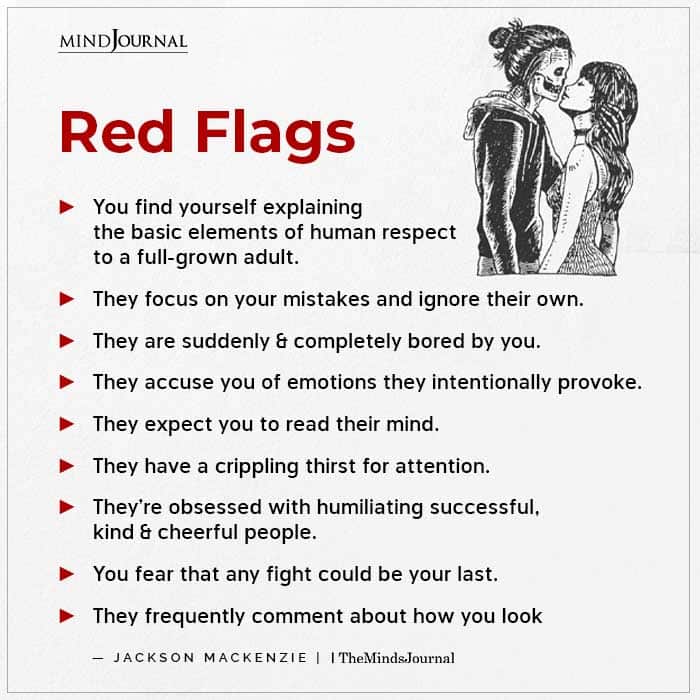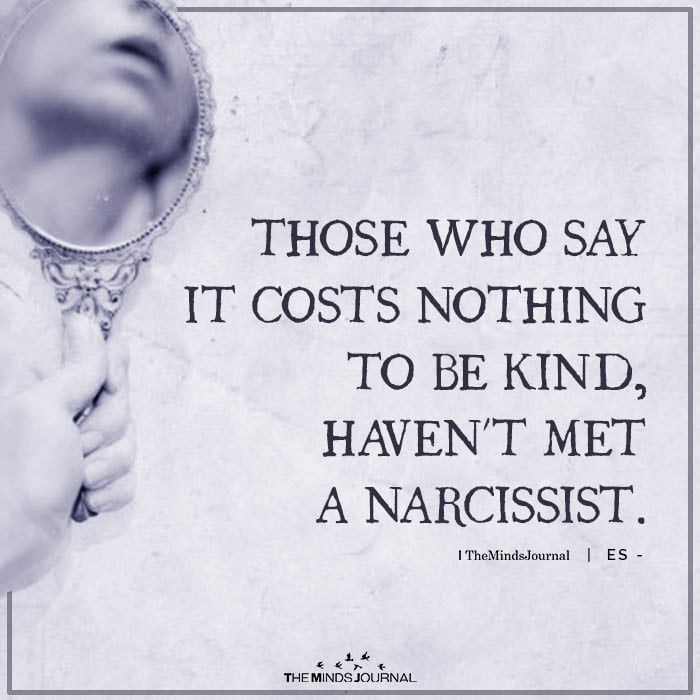When you are dating a narcissist, you should always look out for a few red flags and blind spots that will give you hints as to what kind of toxic person they truly are. Let’s explore the red flags of a narcissist and the signs of dating a narcissist.
People are easily charmed by a narcissist, especially codependents. Narcissists can be beguiling and charismatic. In fact, one study showed that their likable veneer was only penetrable after seven meetings.
I’ve had a number of clients who claimed that the courtship with their narcissistic spouse was wonderful and that abuse only began following the wedding. However, with greater insight, these clients admitted that there were signs that they’d overlooked.
Related: 7 Warning Signs You Are Dating A Narcissist
Blind Spots when Dating a Narcissist
There are unconscious explanations why you might not spot a narcissist. Here are some reasons why you might not recognize a narcissist:
1) Sexual attraction.
The greater the physical attraction and sexual intensity, the easier it is to ignore red flags. Individuals who can see auras maintain that sexual energy literally obfuscates mental and emotional energy―why lust is blind.
2) Seduction.
Narcissists are skilled manipulators. Some can be quite seductive, and not just sexually. They may be adept listeners and communicators or allure you with, flattery, self-disclosure, and vulnerability―just the opposite of what you might expect from a narcissist.

3) Idealization.
Often narcissists are very accomplished, successful, good-looking, powerful, and/or multi-talented. It’s easy to idealize them and want to share in the benefits of their exceptionalism, especially if you feel inferior.
People with low self-esteem, such as codependents, are more likely to idealize someone they admire. They may be drawn to typical narcissistic traits that they themselves lack, such as power and boldness. The downside is that idealization makes us ignore contrary information.
4) Familiarity.
If you had a narcissistic parent, being with a narcissist will feel familiar―like family. This attraction happens beneath consciousness and is often referred to as “chemistry.”
With personal therapy, this attraction can change so that you easily spot someone who is abusive or self-centered. You might even be repelled instead of attracted to a narcissist.
5) Codependency.
If you have low self-esteem or are codependent, you may be unaware of your feelings, which can guide you.
You may not feel entitled to respect and having your needs and wants to be met. Most codependents tend to accommodate and people-please other people―a perfect fit for a narcissist.
This predisposition is stronger in early dating when you’re trying to make a good impression. Thus, you might overlook or rationalize feelings of discomfort and anxiety that signal trouble. If something does bother you, you won’t speak up about it and try to forget it.
Red Flags When Dating A Narcissist
Below are some red flags to look out for. Having a few traits doesn’t mean that someone is diagnosable with NPD―a narcissistic personality disorder―but they do not bode well for a fulfilling relationship.
One study found that when narcissists knew the symptoms of NPD, they readily admitted being a narcissist when asked. So you can ask, too, provided they know the traits. Need for admiration, lack of empathy, and grandiosity are key. Look for signs of arrogance and entitlement, too.
Related: How To Know If You’re Dating A Narcissist
1) Self-centeredness.
For narcissists, the world revolves around them. Other people are only two-dimensional, meaning that narcissists can’t empathize. They’re in their own reality and see you as an extension of themselves to satisfy their needs and wants. When you talk to your date, is he or she interested in getting to know you, or talk only about themselves?
Amazingly, some people do, as if their listener doesn’t exist. This is a tell-tale sign that you will feel invisible in the relationship. If you felt invisible in your family, you might take this for granted. You could possibly feel validated by the attention you give as a good listener. Beware that this pattern will likely continue.
As mentioned above, some narcissists are skilled communicators and will appear fascinated by you, even mirror your interests to make you like them. They may be good at short-term intimacy and make you feel like a king or queen; but eventually, they don’t keep up that act.
You’ll discover that their motive is to get what they want; for example, sex, but that they’re not interested in getting to know more about you, your family, problems, or successes.
Be aware of other signs of lack of consideration: walking far ahead of you, making you track them down for a return phone call, arriving late, disregarding your boundaries and needs, or interrupting conversations to take calls from other people.

2) Arrogance.
Narcissists feel superior to other people and can be rude or abusive when don’t get what they want. This is revealed in their behavior and how they talk about themselves and others. Is your date a fault-finder who criticizes or blames others, the opposite sex, or an ex? One day he or she may be bashing you.
When you go out, notice how he or she treats waitresses, carhops, and vendors. Does he or she show other people respect, or act superior to other certain groups, such as minorities, immigrants, or people of fewer means or education?
Narcissists like to be associated with high-status people and institutions. They think they’re the best and want to surround themselves with the best. This is due to insecurity.
Does your date think only his or her school is the best, and requires the best car, the best table at the best restaurant, the finest wines, and wear expensive labels, or name-drop public figures they know? This may impress you, but will later depress you when you feel ignored or like a prop in their life.
3) Entitlement.
This trait is a giveaway. It reveals how narcissists think that they’re the center of the universe. They not only believe they’re special and superior to others, but also that they deserve special treatment and that rules don’t apply to them.
Does your date refuse to turn off his or her cell phone at the movies, expect others to do favors, cut in line, steal things like tableware, airline blankets, or hotel ashtrays, or insist on special treatment from the parking attendant, restaurant maitre d’, or waiter? If you’re a woman, does he expect you to drive to his neighborhood?
A relationship with this person will be painfully one-sided, not a two-way street. Narcissists are only interested in getting what they want and making the relationship work for them.
4) Bragging and need for admiration.
Although because narcissists want to believe they’re superior and the best, they’re actually insecure. Hence, they need constant validation, appreciation, and recognition.
They seek this by bragging about themselves and their accomplishments. They may even lie or exaggerate. People who brag are trying to convince themselves and you of their greatness.
5) Control and manipulation.
Narcissists put their needs first. They may manipulate you with flattery, belittling, or threats. Their lack of empathy may show when planning a date. Time and place might be a difficult negotiation or on their terms, especially if they sense that you’re interested in them.
Initially, they may want to please you to win you over, but once they’ve made their “catch”, they want to please themselves. It’s the chase, not the catch that motivates them. Once they’re victorious, they can lose interest, and move on to the next conquest before it gets too emotionally intimate. If not, they’ll be emotionally unavailable and keep you at a distance, because they’re afraid if you get too close, you won’t like what you see.
Related: 5 Glaring Signs That You Are Dating A Narcissist And How To Leave Them
Some Tips
Listen to what your dates say about themselves and past relationships. Do they take responsibility or blame other people?
Pay attention if they admit to serious shortcomings, commitment issues, infidelity, criminality, addiction, or abuse. Equally important, notice if you feel anxious or uncomfortable, pressured, controlled, ignored, or belittled.
Learn about narcissistic relationships, why narcissists are codependent, and why they’re drawn to codependents and vice versa.
In recovering from codependency, you’ll build self-esteem, your estimation of your worth will rise, and you’ll expect to be considered, listened to, and treated well. You’ll convey an expectation of respect by maintaining healthy boundaries, by being assertive about your opinions, feelings, needs, and wants.
Want to know more about the red flags of dating a narcissist or the signs you are dating a narcissist? Check this video out below!
Learn about Dealing with a Narcissist.
©Darlene Lancer 2018
Written by Darlene Lancer JD, MFT












Leave a Reply